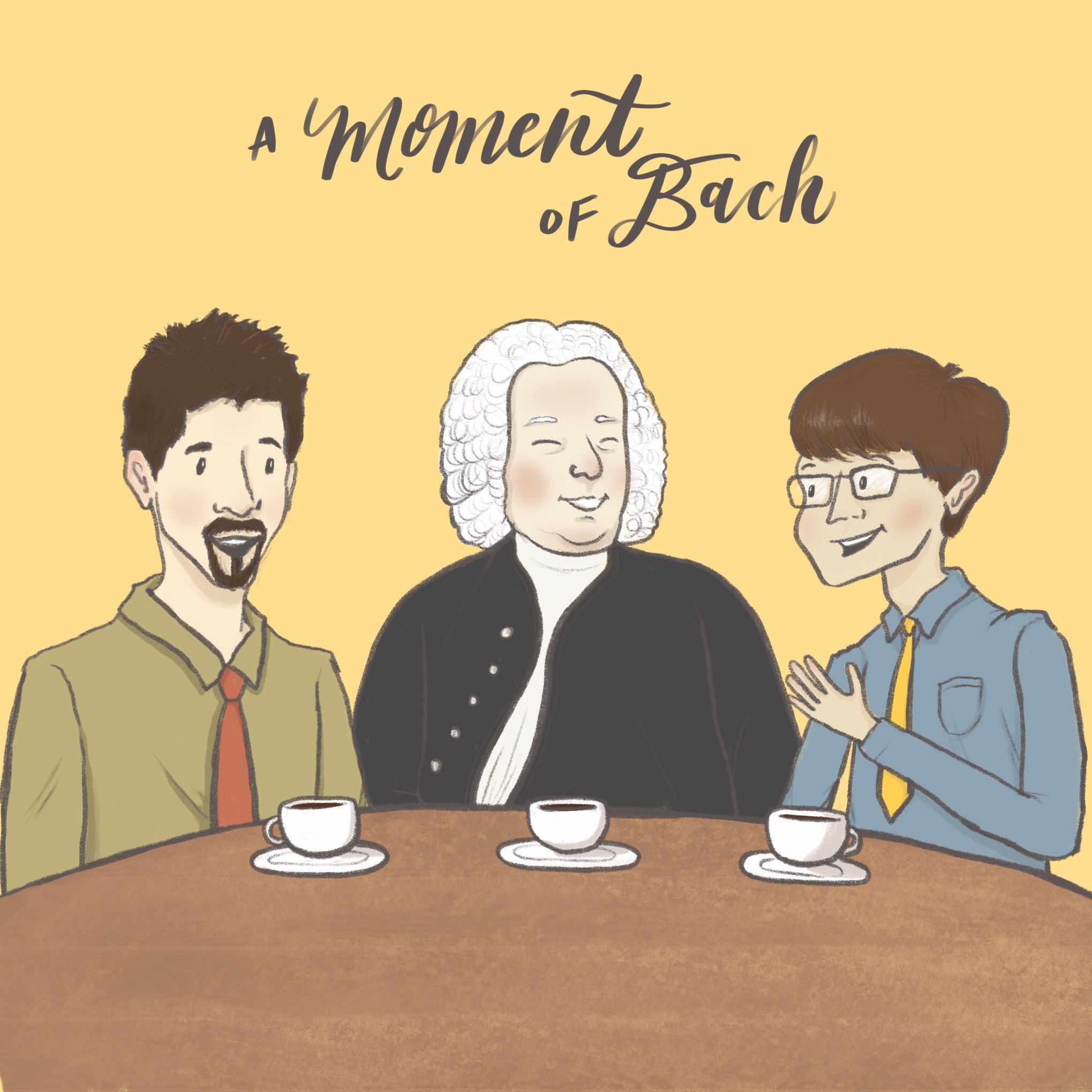
249.3K
Downloads
176
Episodes
Welcome to A Moment of Bach, where we take our favorite moments from J. S Bach's vast output—just a minute's worth or even a few seconds—and show you why we think they are remarkable. Join hosts Alex Guebert and Christian Guebert for weekly moments! Check wherever podcasts are available and subscribe for upcoming episodes. Our recording samples are provided by the Netherlands Bach Society. Their monumental All of Bach project (to perform and record all of the works of J. S. Bach) serves as source material for our episodes. https://www.bachvereniging.nl/en https://www.bachvereniging.nl/en/allofbach Artwork by Sydney LaCom
Episodes

Monday Mar 10, 2025
Great Fantasia and Fugue (BWV 542)
Monday Mar 10, 2025
Monday Mar 10, 2025
Welcome to season 5 of A Moment of Bach!
We kick off the season with a suggestion from Charles Raasch -- the Great Fantasia and Fugue. Does Bach know where he's going with this one? Of course he does, but, it's still fun to get lost in the music. Come with us as we wander into the complex harmonies, built mostly on fully-diminished dissonances, until Bach finally leads us home to a supremely sonorous G major ending.
Great Fantasia and Fugue (BWV 542) performed by Leo Van Doeselaar for the Netherlands Bach Society
Give to the Netherlands Bach Society -- help them finish All of Bach!
PATREON -- a new opportunity to donate to A Moment of Bach -- always optional, always appreciated!

Monday Oct 07, 2024
BACHTOBERFEST: BWV 80 (Ein Feste Burg) with Eric Clausen
Monday Oct 07, 2024
Monday Oct 07, 2024
Our fourth season was the best year yet for our downloads. Thank you for your listenership! And we still welcome your listener "moments" of Bach as ideas for future episodes.
For this season closer, we invite Reverend Eric Clausen, a Lutheran pastor, to help us unpack the background of BWV 80 (A Mighty Fortress Is Our God). The bold and powerful text of the source hymn comes directly from Martin Luther. Bach's cantata incorporates the four hymn stanzas plus poetry by Salomon Franck. Two aMoB listeners suggested moments from BWV 80; we discuss the specific moment requested for the second movement.
PATREON for A Moment of Bach - always optional, always appreciated.
Huge thanks as always to the Netherlands Bach Society for allowing us to use their audio examples on our podcast.
BWV 80 Ein feste Burg ist unser Gott, as performed by Netherlands Bach Society under the leadership of Shunske Sato, Artistic Director

Monday Sep 30, 2024
Ein feste Burg ist unser Gott (BWV 80): alto/tenor duet
Monday Sep 30, 2024
Monday Sep 30, 2024
Martin Luther, J.S. Bach, and Reformation Sunday -- this most Lutheran of all cantatas is our subject for today. "Ein feste Burg" was the battle-cry of the Reformation: "A mighty fortress is our God!" Bach's cantata weaves in all 4 stanzas of Luther's strong hymn.
We marvel at movement 1 with its "dizzyingly complex counterpoint" (as Richard Atkinson puts it in his video). This is one of the maybe 2 or 3 most complex opening chorale fantasias in all of Bach's cantata ouevre, and that's a high bar to clear! But then we zoom in on a more tender moment, the end of the alto/tenor duet in movement 7: "[the heart] will finally be crowned, when it slays death". Here, the bass line drags down in twisting chromatic motion, the tempo slows, and Bach resists the urge to return to an "A" section of text, instead closing the movement with a short instrumental coda.
BWV 80 Ein feste Burg ist unser Gott, as performed by Netherlands Bach Society under the leadership of Shunske Sato, Artistic Director
Come see this very cantata, BWV 80, in Orange, California at a free concert put on by Alex's church music program! October 20, 4pm, more details at this link. Also on the program: a new arrangement of A Mighty Fortress, orchestral liturgical music, BWV 29 sinfonia, and "Dona nobis pacem" from Mass in B minor.
Translation of the text of BWV 80 from bachcantatatexts.org, which we mentioned in this episode
A great article about BWV 80 featured on the Bach Choir of Bethlehem's website
"In Your Eyes" by Peter Gabriel, a song that was referenced in this episode. The last minute or so of the song features the dense instrumentation that Alex mentioned: 2 bassists, 2 drummers, etc. Also, here is a great episode of the podcast Strong Songs which breaks down "In Your Eyes".

Monday Sep 23, 2024
Geist und Seele wird verwirret (BWV 35): first aria
Monday Sep 23, 2024
Monday Sep 23, 2024
The organ, a sacred sound, gets an unusual role in this cantata for solo voice. We hear the organ leaping all over with a virtuoso part against violins and oboes and the alto soloist. There is no better way to convey the rich concept of the "confused joy" of the believer who witnesses miracles.
In this cantata, which took place during the Sunday where the story is read of Jesus healing the deaf and mute, Bach sets his poet's words:
Spirit and soul become confused,
when they gaze on Thee, my God.
For the miracles they know,
And which the people tell with joy,
have made them deaf and mute.
Geist und Seele... from BWV 35, as performed by the Netherlands Bach Society

Monday Sep 16, 2024
Komm, Gott Schöpfer, Heiliger Geist (BWV 667) with Katrina Liao
Monday Sep 16, 2024
Monday Sep 16, 2024
Organist Katrina Liao joins us to talk about one of her favorites, this chorale prelude that is crackling with spiritual fire. The off-beat bass at the beginning is a neat touch -- could Bach have meant to signify the Holy Spirit by focusing on the 3rd division of the beat? -- but, Katrina's favorite moment comes in the second verse, when the bass gets to carry the melody with a strong, reedy pedal sound. Christian also points out a hidden "B-A-C-H" motif.

Monday Sep 09, 2024
Italian Concerto (BWV 971): second movement
Monday Sep 09, 2024
Monday Sep 09, 2024
Why do we play games? Because they're fun? Or is it because they give us a sense of structure and a clear goal, a refreshing contrast to our real lives, which are messy, unpredictable, and complicated?
In the same way, we listen to Bach to give a much-needed feeling of structure and clarity to our hectic, messy lives.
But sometimes, he doesn't quite give us what we expect. He breaks the patterns. And it's at those moments when we can catch a glimpse of the angels in the architecture.

Monday Sep 02, 2024
Fugue no. 4 in C# minor (Well-Tempered Clavier Book I)
Monday Sep 02, 2024
Monday Sep 02, 2024
An austere fugue subject here begins with a strange leap. To play this four-note opening on a keyboard is to outline a symmetrical structure, reminding us of the bare pillar that holds up the structure. Adorned on the structure are two faster, florid themes which enter later in this long piece.
But our moment today is its ending -- a deceptive ending leads to a brief coda, but when it happens, its harmony strikes us with a surprising dissonance, feeling almost like the resolute major tonic triad that it wants to become. But a pesky A natural, the sixth scale degree, dashes this to pieces.
Bertrand Cuiller plays the C# minor fugue (with prelude) for the Netherlands Bach Society

Monday Aug 26, 2024
Liebster Gott, wenn werd ich sterben (BWV 8): opening chorus
Monday Aug 26, 2024
Monday Aug 26, 2024
Today we bring you 24 repeated notes on the same pitch. Can you think of any other Bach piece which features this special effect? Certainly this is unique in the orchestrational context here: a high-pitched recorder, beeping out a digital-sounding alarm clock noise. Or is it a bell ringing? We explore what this all means -- because, of course, with Bach, it MEANS something.

Monday Aug 19, 2024
Der Herr denket an uns (BWV 196): duet (ending)
Monday Aug 19, 2024
Monday Aug 19, 2024
In his early twenties Bach produced this compact, delightful cantata, likely for a wedding. The text of the duet is still applicable in a religious school community:
The Lord shall increase you
more and more,
you and your children.
Bach saves a special effect for the last two measures, where a modern technique is used: from highest of highs to the lowest note of the cello, a single line is passed across the string instruments.
We discuss Christian's recent programming of this cantata on Aug. 25, 2024 for a service honoring school faculty and beginning a school year.

Monday Aug 12, 2024
Violin Concerto in D minor (BWV 1052R)
Monday Aug 12, 2024
Monday Aug 12, 2024
Bach proves his mastery of the Baroque concerto here, as in the Brandenburgs -- except this time, we don't have the original music! We do have a harpsichord concerto as well as an organ concerto version of the first movement (which is actually from a cantata)... but we do not have the violin concerto version, which scholars assume must exist. The reason for this assumption is that this music is suited exceptionally well for the violin, and so, this reconstruction was made.
The first six bars of this piece are some of the most dynamic in Baroque music -- if you ever hear someone complain that classical music is "boring", hand them some good headphones and turn this one on!
Another recording of the same piece by Netherlands Bach Society, led by Shunske Sato
Cantata "Wir müssen durch viel Trübsal" (BWV 146) (featuring the source music for this concerto)
